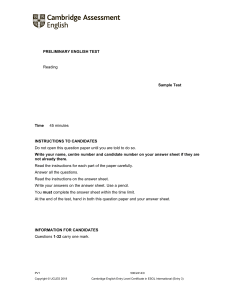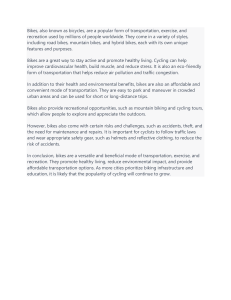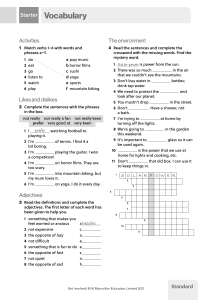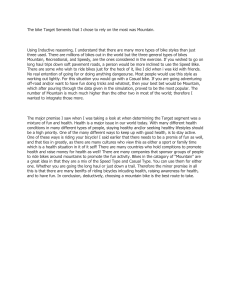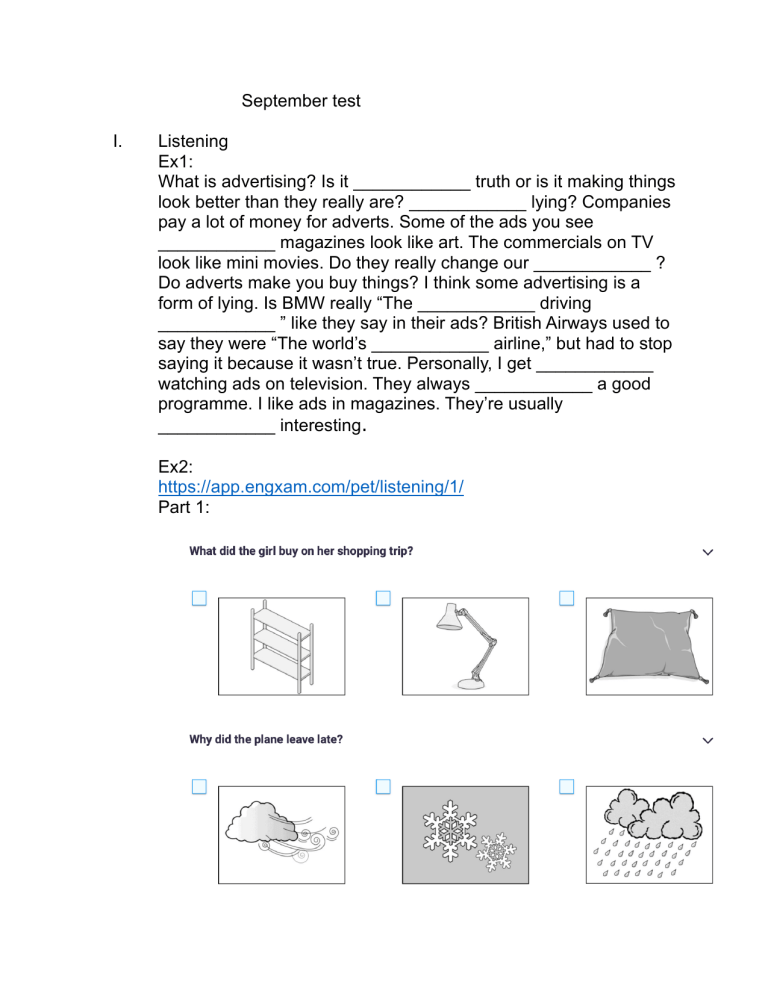
September test I. Listening Ex1: What is advertising? Is it ____________ truth or is it making things look better than they really are? ____________ lying? Companies pay a lot of money for adverts. Some of the ads you see ____________ magazines look like art. The commercials on TV look like mini movies. Do they really change our ____________ ? Do adverts make you buy things? I think some advertising is a form of lying. Is BMW really “The ____________ driving ____________ ” like they say in their ads? British Airways used to say they were “The world’s ____________ airline,” but had to stop saying it because it wasn’t true. Personally, I get ____________ watching ads on television. They always ____________ a good programme. I like ads in magazines. They’re usually ____________ interesting. Ex2: https://app.engxam.com/pet/listening/1/ Part 1: Part 2 You will hear two friends talking about a new clothes shop What does the girl say about it? The staff are helpful. It only has the latest fashions. Prices are reduced at the moment. You will hear two friends talking about a pop band’s website. They think the site would be better if its information was up to date. it was easier to buy concert tickets. the band members answered messages. You will hear a woman telling a friend about an art competition she’s won. How does she feel about it? upset that the prize isn’t valuable excited that the judges liked her picture disappointed that she can’t use the prize You will hear two friends talking about the girl’s flatmate. The girl thinks that her flatmate is too untidy. talks too much. plays music too loud. You will hear two friends talking about a football match. They agree that their team lost because the players weren’t confident enough. they were missing some key players. the players didn’t do the right training. You will hear two friends talking about a tennis match they played The boy wants the girl to help him to get fitter. practise with him more often. enter more competitions with him. Part 3 For each question, write the correct answer in the gap. Write one or two words or a number or a dateor a time. You will hear a radio presenter called Anita talking about her holiday in Cuba.ANITA’S HOLIDAY IN CUBA: In the National Gardens, the __________________ was the thing that attracted most people. On the swimming trip, electronic armbands kept the _______________ away. On the day in the countryside, Anita almost fell off a __________________ . In the capital city, Anita saw a ____________________ in a theatre. Anita enjoyed visiting a farm where _______________________ is produced. Anita bought some ___________________________ as gifts. Part 4 You will hear an interview with a woman called Vicky Prince, a champion swimmer who now works as a swimming coach. Vicky first went in for competitions because she had joined a swimming club. her parents were keen on swimming. her swimming teacher encouraged her. As a teenager, Vicky’s training involved exercising on land as well as in the water. going without meals during the day. travelling to a pool once a day. What did Vicky find hard about her training programme? She couldn’t go on school trips. She lost some of her friends. She missed lots of parties. What helped Vicky to do well in the national finals? She was not expected to win. She trained harder than usual. She wanted to take a cup home. As a swimming coach, Vicky thinks she’s best at teaching people to deal with failure. to improve their technique. to get swimming qualifications. Why has Vicky started doing long-distance swimming? She needed to get fit again. She thought it would be fun. She wanted to do some travelling. II. Reading Read the text and answer the question below Artist Peter Fuller talks about his hobby There’s a popular idea that artists are not supposed to be into sport, but mountain biking is a huge part of my life. It gets me out of my studio, and into the countryside. But more importantly, racing along as fast as you can leaves you no time to worry about anything that’s going on in your life. You’re too busy concentrating on not crashing. The only things you pay attention to are the pain in your legs and the rocks on the path in front of you. I’m in my sixties now, but I started cycling when I was a kid. In the summer my friends and I would ride our bikes into the woods and see who was brave enough to go down steep hills, or do big jumps. The bikes we had then weren’t built for that, and often broke, so I used to draw pictures of bikes with big thick tyres that would be strong enough for what we were doing. They looked just like modern mountain bikes. However, it wasn’t until many years later that someone actually invented one. By the 1980s, they were everywhere. At that time I was into skateboarding. I did that for a decade until falling off on to hard surfaces started to hurt too much. Mountain biking seemed a fairly safe way to keep fit, so I took that up instead. I made a lot of friends, and got involved in racing, which gave me a reason to train hard. I wanted to find out just how fit and fast I could get, which turned out to be fairly quick. I even won a couple of local races. In the end I stopped racing, mainly because I knew what it could mean to my career if I had a bad crash. But I still like to do a three-hour mountain bike ride every week. And if I’m out cycling in the hills and see a rider ahead, I have to beat them to the top. As I go past I imagine how surprised they would be if they knew how old I am. Peter enjoys mountain biking because A. it gives him the opportunity to enjoy the views. B. he can use the time to plan his work. C. he is able to stop thinking about his problems. D. it helps him to concentrate better. What does Peter say about cycling during his childhood? A. He is sorry he didn’t take more care of his bike. B. His friends always had better quality bikes than he did. C. His bike wasn’t suitable for the activities he was doing. D. He was more interested in designing bikes than riding them. Peter says he returned to cycling after several years A. because he had become unfit. B. so that he could enter races. C. in order to meet new people. D. to replace an activity he had given up. How does Peter feel about cycling now? A. He is proud that he is still so fast. B. He is keen to do less now that he is older. C. He regrets the fact that he can no longer compete. D. He wishes more people were involved in the sport. What would be a good introduction to this article? A. For Peter Fuller, nothing matters more than mountain biking, not even his career. Here, in his own words, he tells us why. B. Artist Peter Fuller takes mountain biking pretty seriously. Here he describes how it all began and what he gets out of it. C. In this article, Peter Fuller explains how he became an artist only as a result of his interest in mountain biking. D. After discovering mountain biking late in life, Peter Fuller gave up art for a while to concentrate on getting as good as possible. III. Grammar: Put the word in correct form. 1. I had an uncle in Germany, __________ I inherited a bit of money. (which) 2. We bought a chainsaw, __________ we cut up all the wood. (which) 3. __________cigarettes is bad for you. (smoke) 4. My favorite activity is ___________thrillers (read) 5. I hate ___________( pack) 6. If I ________ a car, I ________ to school. (have, drive) 7. If she ________ foreign languages, she ________ a job more easily. (speak, get) 8. I ________ to the doctor if I ________ you. (go, be) 9. If I ________ the lottery, I ________ myself for a new life. (win, prepare) 10. If I ________ a purse on the sidewalk, I ________ it to the lost and found office. (find, take) 11. We (have) ………… English lessons on Tuesday and Friday. 12. - Where is Phong? - I think he (read) ……….. in the library. 13. Chau usually (listen)........... to the teacher in class, but she is not listening now; she (look) …………. out of the window. 14. I _____ at my mom’s home yesterday. (stay) 15. Hannah ______ to the theatre last Sunday. (go)
